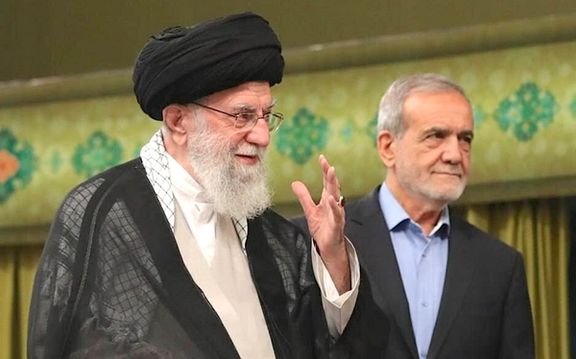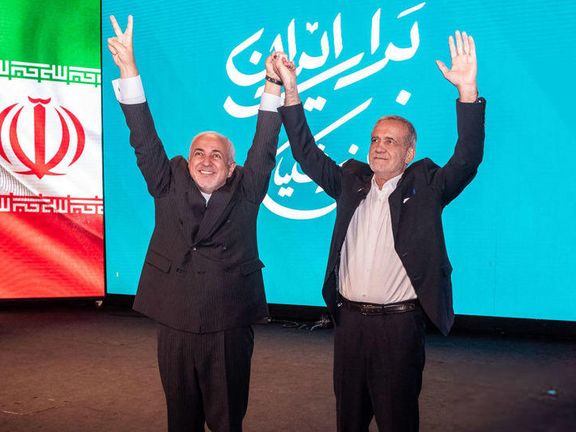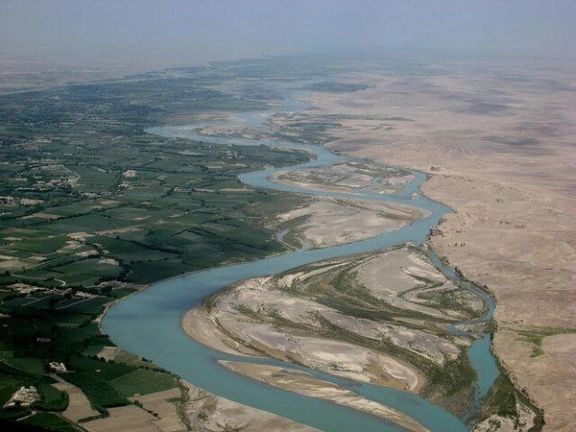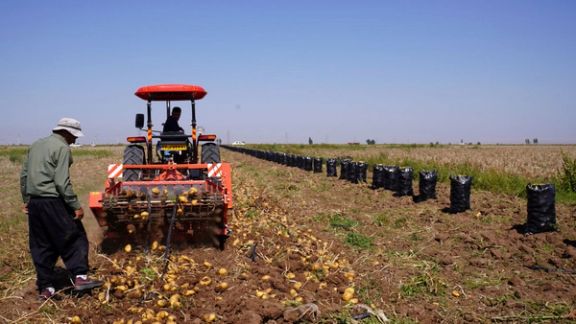Iranian ex-ministers sentenced in major trade corruption case

Two former Iranian ministers have been sentenced to prison for their roles in a major corruption case involving the tea company Debsh, according to Iran’s judiciary spokesperson.

Two former Iranian ministers have been sentenced to prison for their roles in a major corruption case involving the tea company Debsh, according to Iran’s judiciary spokesperson.
Former trade minister Reza Fatemi-Amin received a one-year sentence and former agriculture minister Javad Sadatinejad was handed two years after both found guilty of “complicity in disrupting the country’s economic system”.
The sentencing of former government officials marks a rare instance of high-profile figures being prosecuted in the Islamic Republic. Appeals and commutations have meant similar sentences are often not fully implemented.
The Debsh Tea scandal, one of the largest financial corruption cases in Iran’s history, involved financial misconduct amounting to approximately $3.4 billion. Investigations uncovered widespread fraud, including large-scale tea smuggling, currency manipulation and illegal acquisition of foreign exchange.
At the center of the scandal was the industrial group’s CEO Akbar Rahimi Darabad, who on Monday was sentenced to 66 years in prison for various economic crimes according to his spokesman, including organized smuggling and bank fraud.
Rahimi Darabad has also been required to return over €2 billion in received foreign currency facilities and pay fines for various smuggled tea shipments.
The two ex-ministers were among 44 individuals found guilty in the case, which allegedly involved Iran’s Central Bank and customs and various ministries, raising public concerns over the extent of economic misconduct in the country.
The investigation alleged that Debsh Tea had exploited government policies to acquire vast amounts of foreign currency at official exchange rates, later selling it at significantly higher prices on the open market.
The company also smuggled tea into the country without fulfilling tax and import obligations.

Only 17 Asiatic cheetahs remain in the world and all reside within Iran, according to the head of Iran’s Environmental Protection Organization, putting the species to the brink of extinction.
Shina Ansari made the announcement during a memorandum of understanding signing ceremony with the Traffic Police, emphasizing the urgent need for collaborative action.
Ansari highlighted the crucial role of inter-agency cooperation, particularly from the Traffic Police, in safeguarding the remaining cheetah population. She stressed the necessity of enforcing speed limits within cheetah habitats to mitigate the risk of fatal collisions with vehicles.
A section of the Abbasabad to Mashhad road in northern-northeastern Iran cuts through one of the most vital cheetah habitats, resulting in annual cheetah deaths due to vehicular impact.
Ansari acknowledged the Traffic Police's recent efforts to implement safe speed reductions in the area, a collaborative measure with the Environmental Protection Organization.
Road accidents, responsible for 52% of cheetah deaths, continue to threaten the endangered species due to the Iranian Department of Environment's inaction. In other countries, protective measures such as road fencing and the construction of wide overpasses in natural habitats have been adopted to ensure the safe passage of animals.
"We need to protect these valuable cheetahs," Ansari noted, expressing hope that the partnership with the Traffic Police will continue and expand to encompass the protection of all wildlife within Iran.
Once dispersed across vast areas of Asia, the Iranian cheetah is now listed on the International Union for Conservation of Nature (IUCN) Red List as a species on the brink of extinction, confined to remote regions in central Iran. A 2021-2023 survey had put the number of cheetahs to 26.

Iran's president Masoud Pezeshkian’s hinted at disagreement with Ali Khamenei over US negotiations, in a sign of his apparent frustration with his role.
“I personally believed it would be better to negotiate [with the US], but the Supreme Leader said we will not talk with the US. So I said we would not negotiate with the US. It was done and over with, it was done and over with,” Pezeshkian said, his tone possibly reflecting frustration, during a speech in Parliament on Sunday. He was attending the session as lawmakers debated the impeachment of his economy minister, Abdolnaser Hemmati.
This marks the first time an Iranian president, while still in office, has openly acknowledged a significant policy disagreement with Khamenei on a matter of dire national importance.
At a press briefing on Monday, Iranian Foreign Ministry spokesman Esmaeil Baghaei emphasized that Pezeshkian’s remarks were clear and meant that his government would adhere to "policies ordained by the top officials of the country"—a phrase commonly understood to refer to Khamenei.
A mission derailed?
When the reform-leaning Pezeshkian was unexpectedly allowed to run in the June snap presidential election, many speculated that his candidacy was intended to facilitate negotiations with the US while also serving as a scapegoat if the talks failed.
"Pezeshkian was supposed to be the president who negotiated with the US," political commentator Sahand Iranmehr wrote on X, arguing that after Trump’s election, Iran’s real decision-makers reversed course. According to Iranmehr, Pezeshkian’s speech in Parliament reflected a leader whose mission had been completely erased—a man who now appears aimless, sidelined, and even ashamed.
There are also some speculations that Pezeshkian’s candid admission of his disagreement with Khamenei was a deliberate—perhaps desperate—attempt to shift responsibility for the consequences of refusing negotiations onto the Supreme Leader himself.
By publicly acknowledging his stance, Pezeshkian may have sought to make it clear that if the economic and political crisis worsens, it will be Khamenei and the hardliners opposed to negotiations rather than his government who should bear the blame.
Fallout from Pezeshkian’s admission
On Sunday, the hardline-dominated Parliament voted to remove Pezeshkian's reformist economy minister. Hours later, he also lost his strategic affairs deputy, Mohammad-Javad Zarif, a figure despised by hardliners for advocating diplomacy with the US.
In an X post, Zarif announced his resignation, stating that he was stepping down on the "advice" of Chief Justice Gholam-Hossein Mohseni-Ejei. Pezeshkian has yet to officially accept his resignation.
Due to the sensitivity of the issue, most politicians and commentators in Iran have refrained from directly commenting on Pezeshkian’s remarks. Instead, they have either quoted him verbatim or expressed disappointment in vague terms.
However, ordinary Iranians—many posting anonymously on social media or sending recorded messages to Iran International TV—have been far more direct in their criticism and many say he should resign now that he has realized he has no power to deliver his election promises, including resolving the issue of sanctions through direct talks with the US.
“It was you who mocked [Saeed] Jalili [in election debates] saying nothing could be done unless sanctions were lifted. Now you are saying you wanted to negotiate but will not do so because Ali Khamenei says no,” one of the angry citizens said in a recorded messages sent to Iran International.
Others who had hoped Pezeshkian would break the deadlock over sanctions expressed deep disillusionment. A businessman in Tehran, speaking anonymously to Iran International, said voting for Pezeshkian had been "the last chance" for him and many others who had hoped change could come through elections.
"With the possibility of sanctions worsening due to Khamenei’s obstinacy, things that are already bad could spiral into something much worse. When all hope is lost, a countdown to the public’s complete disillusionment with the regime will begin, possibly in the next few months," he warned.
Khamenei’s history of blocking US negotiations
Khamenei has a long history of obstructing presidents who sought negotiations with the US. However, his stance has not always been absolute. While he denied permission to Akbar Hashemi-Rafsanjani and Mohammad Khatami, he allowed secret talks with US officials in Oman from 2013-2015 that resulted in the JCPOA nuclear deal.
“Rafsanjani advocated talks with the US but was not given permission. Neither did Khatami. Mahmoud [Ahmadinejad] was allowed but he wasn’t taken seriously [by the other side]. Then there was Rouhani who managed to make the nuclear deal but denied permission to continue. Raisi tried secretly for three years but failed. And Pezeshkian said today that he wants negotiations but [is forbidden]… and the story will continue,” wrote Ghorbanali Salavatian, a reformist public figure and Iran-Iraq War veteran, in an X post.

The formal resignation of Mohammad Javad Zarif, Iran’s Vice-President for Strategic Affairs has sparked sharp political reactions in Iran, with hardliners celebrating his exit and reformists warning of its broader implications.
His departure came less than four weeks after Supreme Leader Ali Khamenei reaffirmed his opposition to negotiations with the United States, a stance that undermined Zarif’s role in the government.
Zarif announced his resignation on Sunday, saying that the powerful Judiciary had asked him to return to teaching at the university, ostensibly because his children hold US citizenship.
Several conservative lawmakers seized the moment to push for further resignations. Tehran MP Amirhossein Sabati said, "There are several other officials in the government who must either revoke their children’s dual nationality or be removed from their positions."
Hardliners like Sabeti cite a law that bans individuals with dual citizenship or close relatives with dual citizenship from holding sensitive positions as the basis for the action.
Zarif's children were automatically granted US citizenship at birth in New York while he spent much of his career with the Iranian delegation at the United Nations.
Although they now reside in Iran, the Law on the Appointment of Individuals to Sensitive Positions, enacted in October 2022, bans Zarif from holding his position as vice president for strategic affairs.
Hardliner MP Hamid Rasaei dismissed the notion that Zarif had voluntarily resigned, saying, "Someone whose presence is legally null and void cannot resign. Rather, after being formally charged, they should be dismissed from the position they unlawfully occupied."
Zarif’s allies and reformist figures have framed his resignation as a significant loss. Hesamoddin Ashna, an advisor to former President Hassan Rouhani, suggested that Zarif had been forced out. Others, including Hassan Younesi, said his departure would be welcomed by Israeli Prime Minister Benjamin Netanyahu.
Early Monday, Zarif posted on X that he had been invited to a meeting with judiciary chief Gholamhossein Mohseni Ejei, who "recommended that I return to the university to prevent further pressure on the government. I immediately accepted."
Political analyst Mohsen Sazgara told Iran International TV that Zarif was no longer useful to the government after Khamenei banned negotiations with the US. "Khamenei put figures like Hemmati and Zarif to be grilled by the hardliners, and there is a chance some other ministers might be impeached," he said.
Reformist commentators have warned that Zarif’s resignation, coming shortly after the impeachment of Economy Minister Abdolnaser Hemmati, signals growing instability within Pezeshkian’s administration.
Abbas Abdi told Khabar Online that official positions on potential US negotiations had "closed off possibilities, forcing Pezeshkian to confront harsh realities that he had not anticipated."
The relatively moderate Etemad newspaper reported that Hemmati’s impeachment may have been orchestrated outside parliament, suggesting that "internal parliamentary events had little influence" on the decision. In contrast, the conservative Kayhan newspaper welcomed Hemmati’s removal, calling it a necessary step for economic reform.
Iran’s parliament impeached Economy Minister Abdolnaser Hemmati on Sunday, bringing his tenure to an end after lawmakers blamed him for the country’s worsening economic crisis.
The vote followed a heated session in which Hemmati defended his record while critics pointed to the surging exchange rate and rising inflation.
Parliament voted 182 to 89 in favor of impeachment, with one abstention and one void ballot out of 273 total votes. Under Article 135 of Iran’s Constitution, ministers remain in office unless dismissed by the president or voted out by parliament.

The Taliban has diverted water from the Helmand River (known as Hirmand in Iran) despite previous promises to release Iran’s share, according to satellite images cited by Tehran-based Shargh newspaper.
The images show that Afghanistan is diverting the water into its Godarzeh salt flat instead.
The move exacerbates severe drought conditions in southeastern Iran's Sistan and Baluchestan province, a region heavily reliant on the Hirmand.
The Taliban's repeated obstruction of Iran's water access since 2021 has become a major point of contention between the two nations.
The report comes amid escalating tensions over the construction of dams on transboundary rivers, which has significantly reduced water flow to Iran’s drought-stricken eastern provinces.
In January, a member of Iran’s Parliament National Security and Foreign Policy Committee said the Taliban’s governance in Afghanistan has hindered regional cooperation on critical issues like shared water resources.

Potato prices in Iran have surged by a staggering 217% in the past year, according to the Statistical Center of Iran, highlighting a sharp increase in the cost of essential food items.
The sharp rise in the price of a staple food, now a lifeline for an increasingly impoverished population, has become a major public concern in recent weeks, a trend now confirmed by official data.
The average price of potatoes reached over 500,000 rials (about 54 US cents) per kilogram in February, up from approximately 150,000 rials a year earlier. Today, the average Iranian worker earns roughly $120-170 per month, while official estimates suggest that a minimum of $500 is needed for the basic survival of a family of three.
The surge positions potatoes as the food item with the highest price increase in the past 12 months, significantly exceeding the country's general inflation rate, which according to official figures hovers around 35%.

Attributing the sharp rise in potato prices to increased exports and smuggling, Agriculture Minister Gholamreza Nouri Ghezeljeh said on Sunday that exports have been halted. "More potatoes were exported this year compared to last year, and some were also smuggled," he said.
Due to fuel and other government subsidies, it is cheaper to produce food staples in Iran than in some neighboring countries. Also, as Iran's currency has lost 50% of its value since September, exporting any homegrown product for foreign currency has become more rewarding.
Paradoxically, Deputy Agricultural Minister Akbar Fat'hi announced in January that Iran was importing 50,000 tons of potatoes to combat soaring prices.
The imported potatoes, aimed at stabilizing the market, were to be sold at approximately 30 US cents per kilogram, significantly below current prices. He warned further imports may be necessary if the market remains volatile.
Eggplant also saw a substantial price increase of 123%, ranking second among food items with the highest annual inflation.
The Statistical Center's report revealed that a broad range of essential goods, including legumes, rice, and dairy products, have experienced significant price hikes in recent weeks. Pinto beans, for instance, saw a 30% increase in just one month, while Iranian rice rose by an average of 13.5%.
While many food categories experienced significant inflation, chicken and beef prices remained relatively stable, with increases of 4% and 8%, respectively. This stability is likely due to decreased demand as rising costs force many Iranians to reduce meat consumption.